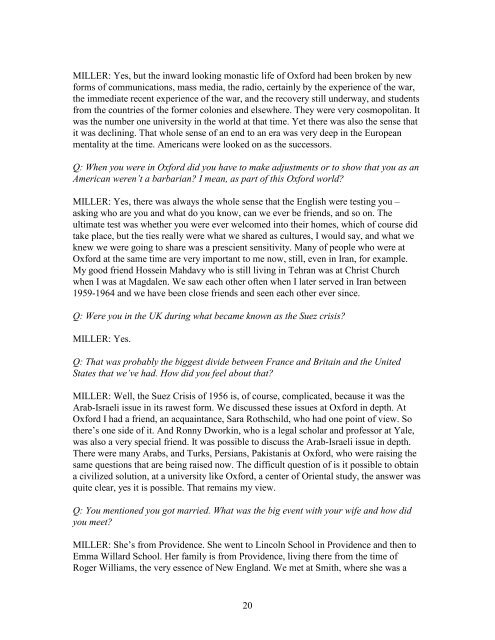1 The Association for Diplomatic Studies and Training Foreign ...
1 The Association for Diplomatic Studies and Training Foreign ...
1 The Association for Diplomatic Studies and Training Foreign ...
Create successful ePaper yourself
Turn your PDF publications into a flip-book with our unique Google optimized e-Paper software.
MILLER: Yes, but the inward looking monastic life of Ox<strong>for</strong>d had been broken by new<br />
<strong>for</strong>ms of communications, mass media, the radio, certainly by the experience of the war,<br />
the immediate recent experience of the war, <strong>and</strong> the recovery still underway, <strong>and</strong> students<br />
from the countries of the <strong>for</strong>mer colonies <strong>and</strong> elsewhere. <strong>The</strong>y were very cosmopolitan. It<br />
was the number one university in the world at that time. Yet there was also the sense that<br />
it was declining. That whole sense of an end to an era was very deep in the European<br />
mentality at the time. Americans were looked on as the successors.<br />
Q: When you were in Ox<strong>for</strong>d did you have to make adjustments or to show that you as an<br />
American weren’t a barbarian? I mean, as part of this Ox<strong>for</strong>d world?<br />
MILLER: Yes, there was always the whole sense that the English were testing you –<br />
asking who are you <strong>and</strong> what do you know, can we ever be friends, <strong>and</strong> so on. <strong>The</strong><br />
ultimate test was whether you were ever welcomed into their homes, which of course did<br />
take place, but the ties really were what we shared as cultures, I would say, <strong>and</strong> what we<br />
knew we were going to share was a prescient sensitivity. Many of people who were at<br />
Ox<strong>for</strong>d at the same time are very important to me now, still, even in Iran, <strong>for</strong> example.<br />
My good friend Hossein Mahdavy who is still living in Tehran was at Christ Church<br />
when I was at Magdalen. We saw each other often when I later served in Iran between<br />
1959-1964 <strong>and</strong> we have been close friends <strong>and</strong> seen each other ever since.<br />
Q: Were you in the UK during what became known as the Suez crisis?<br />
MILLER: Yes.<br />
Q: That was probably the biggest divide between France <strong>and</strong> Britain <strong>and</strong> the United<br />
States that we’ve had. How did you feel about that?<br />
MILLER: Well, the Suez Crisis of 1956 is, of course, complicated, because it was the<br />
Arab-Israeli issue in its rawest <strong>for</strong>m. We discussed these issues at Ox<strong>for</strong>d in depth. At<br />
Ox<strong>for</strong>d I had a friend, an acquaintance, Sara Rothschild, who had one point of view. So<br />
there’s one side of it. And Ronny Dworkin, who is a legal scholar <strong>and</strong> professor at Yale,<br />
was also a very special friend. It was possible to discuss the Arab-Israeli issue in depth.<br />
<strong>The</strong>re were many Arabs, <strong>and</strong> Turks, Persians, Pakistanis at Ox<strong>for</strong>d, who were raising the<br />
same questions that are being raised now. <strong>The</strong> difficult question of is it possible to obtain<br />
a civilized solution, at a university like Ox<strong>for</strong>d, a center of Oriental study, the answer was<br />
quite clear, yes it is possible. That remains my view.<br />
Q: You mentioned you got married. What was the big event with your wife <strong>and</strong> how did<br />
you meet?<br />
MILLER: She’s from Providence. She went to Lincoln School in Providence <strong>and</strong> then to<br />
Emma Willard School. Her family is from Providence, living there from the time of<br />
Roger Williams, the very essence of New Engl<strong>and</strong>. We met at Smith, where she was a<br />
20
















